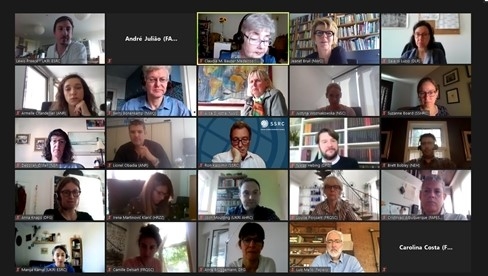

Collaborative projects in these knowledge areas can produce information that helps policymakers understand the behavioral changes required to manage the ongoing public health crisis and mitigate its impacts, according to participants in the annual meeting of the Trans-Atlantic Platform, held online in September.
Collaborative projects in these knowledge areas can produce information that helps policymakers understand the behavioral changes required to manage the ongoing public health crisis and mitigate its impacts, according to participants in the annual meeting of the Trans-Atlantic Platform, held online in September.
Collaborative projects in these knowledge areas can produce information that helps policymakers understand the behavioral changes required to manage the ongoing public health crisis and mitigate its impacts, according to participants in the annual meeting of the Trans-Atlantic Platform, held online in September.

Collaborative projects in these knowledge areas can produce information that helps policymakers understand the behavioral changes required to manage the ongoing public health crisis and mitigate its impacts, according to participants in the annual meeting of the Trans-Atlantic Platform, held online in September.
By André Julião | Agência FAPESP – COVID-19 offers new opportunities for research in social sciences and humanities. With treatments still incipient and prospective vaccines still on trial, behavioral measures remain the main instrument for health authorities around the world to cope with the pandemic.
Social and human science research on aspects of the public health crisis is therefore vitally important both during and after the pandemic. This was the focus for the annual meeting of the funding agencies that participate in the Trans-Atlantic Platform (T-AP), held online on September 8-9, 2020.
Launched in 2013, the initiative connects research funding organizations from South America, North America, and Europe with the aim of funding and fostering international collaborative research in social sciences and humanities, and focusing on transatlantic aspects whenever possible.
“The Trans-Atlantic Platform is currently the most important means of promoting international research in these knowledge areas. It has so far issued two calls for proposals, in which hundreds of researchers in Europe and the Americas took part. FAPESP has been a partner since the platform’s inception and has played an important part in its development. The Foundation also has a key role in encouraging other Latin American countries to join the initiative,” Ted Hewitt, who chairs T-AP, told Agência FAPESP. Hewitt is President of Canada’s Social Sciences and Humanities Research Council (SSHRC).
According to Jeanet Bruil, co-chair of T-AP and head of the Department of Social Sciences and Humanities at the Netherlands Organization for Scientific Research (NWO), the socio-economic changes driven by the pandemic affect individuals, groups and society very strongly. “Sound research-based knowledge in social sciences and humanities can help us deal with a problem of such magnitude,” she said. “Cross-border research can help countries share data and knowledge and make comparisons”.
For Hewitt, until effective treatments and vaccines are available, public health authorities and governments must rely mainly on behavior-changing measures to manage the crisis triggered by the pandemic. “The measures taken have ranged from physical distancing and mask-wearing to the development of local and regional economic management policies,” Hewitt said. “This relates directly to the critical role of social sciences and the humanities in providing evidence to support the development and implementation of public policies both domestically and internationally.”
FAPESP has supported the initiative since it as launched in 2013. Funding initially came from the European Commission, but the contract expired and the platform continued as an independent body funded by the participating agencies themselves. In 2019, 12 funding agencies renewed their commitment to the platform with the aim of increasing the amount of transatlantic collaborative research in social sciences and humanities, which includes reinforcing its support for scientific cooperation and policies aligned with 21st-century research needs.
“A program of virtual events has been scheduled for the months ahead. We also plan to issue another joint call for research proposals, the third held by T-AP,” said Claudia Bauzer Medeiros, a member of the steering committee for the FAPESP Research Program on eScience and Data Science and FAPESP’s representative on T-AP’s Management Team.
Republish
The Agency FAPESP licenses news via Creative Commons (CC-BY-NC-ND) so that they can be republished free of charge and in a simple way by other digital or printed vehicles. Agência FAPESP must be credited as the source of the content being republished and the name of the reporter (if any) must be attributed. Using the HMTL button below allows compliance with these rules, detailed in Digital Republishing Policy FAPESP.





